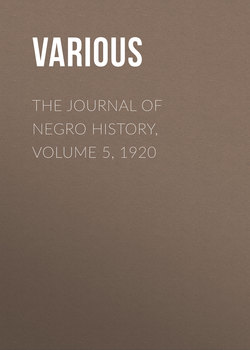The Journal of Negro History, Volume 5, 1920

Реклама. ООО «ЛитРес», ИНН: 7719571260.
Оглавление
Various. The Journal of Negro History, Volume 5, 1920
The Journal of Negro History. Vol. V., No. 1 January, 1920
THE NEGRO IN EDUCATION1
THE NEGRO MIGRATION TO CANADA AFTER THE PASSING OF THE FUGITIVE SLAVE ACT
RICHARD HILL127
THE RELATIONS OF NEGROES AND INDIANS IN MASSACHUSETTS
DOCUMENTS
SOME NEGRO MEMBERS OF RECONSTRUCTION CONVENTIONS AND LEGISLATURES AND OF CONGRESS 158
JAMES G. THOMPSON, THE ORIGINAL CARPETBAGGER177
BOOK REVIEWS
NOTES
The Journal of Negro History. Vol. V—April, 1920—No. 2
THE DEVELOPMENT OF THE NEGRO PUBLIC SCHOOL SYSTEM IN MISSOURI178
RELIGIOUS EDUCATION IN NEGRO COLLEGES AND UNIVERSITIES296
THE AFTERMATH OF NAT TURNER'S INSURRECTION304
DOCUMENTS
Speech of William H. Gray before the Arkansas Constitutional Convention, 1868366
CORRESPONDENCE
BOOK REVIEWS
NOTES
The Journal of Negro History. Vol. V—July, 1920—No. 3
THE SLAVE IN CANADA
Preface
CHAPTER I
CHAPTER II
CHAPTER III
CHAPTER IV
CHAPTER V
CHAPTER VI
CHAPTER VII
CHAPTER VIII
BOOK REVIEWS
NOTES
The Journal of Negro History. Vol. V—October, 1920—No. 4
DIPLOMATIC RELATIONS BETWEEN THE UNITED STATES AND GREAT BRITAIN BEARING ON THE RETURN OF NEGRO SLAVES, 1783-1828567
THE NEGRO IN POLITICS650
HENRY BIBB, A COLONIZER
MYRTILLA MINER
COMMUNICATIONS
DOCUMENTS
SOME UNDISTINGUISHED NEGROES
BOOK REVIEWS
NOTES
Отрывок из книги
In the early history of America there were three types of settlements—the French, Spanish, and English. In the French Provinces the teachings of the "Code Noir" made it incumbent upon the masters to teach the slaves, at least to read, in order, of course, that they might read the Bible; and in the Spanish districts the Latin custom of miscegenation prevented the rise of objections to the teaching of slaves, in case there should be any who cared to instruct the Negroes. In the English Provinces, on the other hand, since teaching the slaves would probably result in their becoming Christians, the colonists naturally were strenuous in their efforts to prevent any enlightenment of the blacks, due to the existence of an unwritten law to the effect that no Christian might be held a slave. Many planters forbade the teaching of their slaves, until finally the Bishop of London settled the difficulty by issuing a formal declaration in which he stated that conversion did not work manumission.2
The rudimentary education of Negroes was one of the first claims on pioneer Christian teachers. Although the Negro Year Book for 1914-15 makes note of a public school for Indians and Negroes established in 1620, according to Brawley and Du Bois, the first schools to be established were private institutions.3 In New York City in 1704 a school was opened for Negroes and Indians by Elias Neau and in 1750 Anthony Benezet established an evening school for the blacks in Philadelphia. The Society for the Propagation of the Gospel established in Charleston in 1744 a mission school, in which two Negroes were employed to instruct their fellowmen. The free Negroes in Charleston established a school in 1774 and those in Boston started a school in 1798. In 1764 the editor of a paper in Williamsburg, Virginia, opened a school for Negroes and in 1800 a schoolhouse and 350 acres of ground were left by the will of Robert Pleasants to be used for the benefit of Negro children.4 About this same time in Newark, New Jersey, the Kosciusko School was established by means of a sum amounting to $13,000 left by Kosciusko for the education of the Negroes.5 In the Middle West private schools had been organized by manumitted Negroes.
.....
Prejudice is an important factor in the attitude of the white race toward Negro education. This prejudice seems to be in all sections of the country, but it is the southerner who is heard from the most, possibly because he is more in contact with the real problem and then because it seems to be a policy of southern politicians to attempt to outdo each other in their speeches along the line of race prejudice. According to Weatherford prejudice has arisen out of the fear that education will lead to the dominance of the Negro in politics and to promiscuous mingling in social life. "The southern white man will never be enthusiastic for Negro education, until he is convinced that such education will not lead to either of these."62 This feeling of a group is expressed in the following statement in a report to the Baltimore Council by a committee in 1913: "No fault is found with the Negroes' ambitions," said the report, "but the Committee feels that Baltimoreans will be criminally negligent as to their future happiness, if they suffer the Negroes' ambitions to go unchecked."63 Mr. Thomas Dixon, Junior, deplores the fact that Washington was training the Negroes to be "masters of men," stating that "if there is one thing the southern white man cannot endure it is an educated Negro."64
School officials and educators on the other hand show an entirely different attitude. Mr. Glenn, recently Superintendent of Education of Georgia, made the declaration that "The Negro is … teachable and susceptible to the same kind of mental improvement characteristic to any other race."65 Thomas Nelson Page states that "the Negro may individually attain a fair and in uncommon instances a considerable degree of mental development."66 Another states that "We must educate him because ignorant men are dangerous, especially to a democracy pledged to educate all men."67 Some believe that we must also educate him for self-protection from vice and disease. The Southern Educational Association in 1907 passed the following resolution: "We endorse the accepted policy of the States of the South in providing educational facilities for the youth of the Negro race, believing that whatever the ultimate solution of this grievous problem may be, education must be an important factor in that solution."68
.....